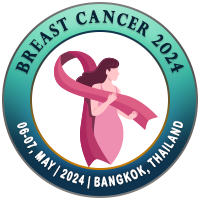
Prof. Salman M Hyder
University of Missouri, ColumbiaBiography
Hyder's overall aim is to
identify hormone dependent molecular targets, and selective steroid receptor
modulators, that can be utilized for anti-angiogenic therapy of endocrine
dependent disease such as breast, uterine and prostate cancer.
Formation of new blood vessels,
or angiogenesis, is crucial for normal processes such as embryonic development,
wound healing, and endometrial regeneration following menstruation.
Angiogenesis is also essential for tumor growth and metastasis. An emerging
field in cancer therapeutics is the targeting of new blood vessels to curtail
tumor growth. It has been known for a while that breast and uterine cancers are
under the influence of female sex-steroid hormones (estrogen and progesterone),
and that expansion of any tumor is dependent on the formation of new blood
vessels.
Surprisingly, very little
information is available on how steroid hormones regulate the process of angiogenesis
in normal or neoplastic breast and uterine cells. Hyder's laboratory is
currently focusing on the role of steroid hormones, clinically relevant
anti-hormones, and endocrine-disruptors to understand the basic mechanisms
involved in hormone driven angiogenesis in breast, and uterine tissue. Hyder's
team has recently discovered that one of the most potent angiogenic growth
factor, Vascular Endothelial Growth Factor (VEGF) is under hormonal control in
the breast and uterine cells. Hyder is now determining the role of estrogen and
progesterone receptors in VEGF induction at the cellular and molecular level by
examining the interaction of receptors with the VEGF gene.
Another focus of
Hyder'slaboratory is to investigate the molecular mechanisms of steroid hormone
action with a current focus on the role of natural and synthetic ligands in
modulating the biological activity of steroid receptors. Hyder's interest in
this area stems from the fact that one ligand can have diverse biological
effects in different target tissues. While ligands may function as agonists in
one tissue, the same ligand may have an opposite effect in another tissue that
contains the same steroid receptor. Many synthetic ligands
(agonists/antagonists) are consumed by millions of women all over the world for
oral contraception, hormone replacement therapy or treatment of breast cancer.
Consumption of some of these ligands are associated with increased risk of
breast and/or uterine abnormalities. Hyder is currently interested in the mechanisms
of action of anti-hormones that have mixed agonist/antagonist properties (e.g
tamoxifen; mifepristone), pure antagonists (Faslodex), and complicated
antagonists that bind one type of steroid receptor, but influence the
biological activity of other receptors by cross-talk mechanisms.
Hyder is examining if cross-talk
mechanisms involve alternative pathways (e.g. MAP Kinase), resulting in
non-ligand dependent activation/inhibition of certain receptors. He anticipates
that understanding the molecular basis/pharmacology of anti-hormone-receptor
interactions will allow development of better therapeutic modalities for
treatment of hormone dependent tumors, as well as endometriosis, osteoporosis
and infertility.
Research Interest
Role of Steroid Hormones in
Breast Tumor Progression and Metastasis: Regulation of Angiogenic Growth
Factors
Mechanisms of Steroid Hormone
Action and Anti-Hormone Resistance
Novel Therapeutic Approaches for
Anti-Angiogenic Therapy of Breast Cancer

